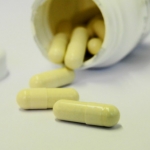CYP3A4 is an intestinal enzyme that is part of the Cytochrome P450 metabolic system. It is important in many drug-drug and drug-food interactions, and it is one of the first enzymes to break down medications when they enter the body.
Grapefruit juice has been demonstrated to inhibit the functioning of CYP3A4 and its effect on the metabolism of a number of drugs by varying degrees. This interaction may result in higher levels of some drugs in the body. Because it takes grapefruit juice approximately one day to leave the body (i.e. its recovery half-life is one day), taking medications at a different time of day is not an adequate solution to avoid this problem. This can be dangerous if a patient is not aware of this effect, as increased medication concentration can lead to adverse reactions.
Many types of psychiatric medications, including most SSRIs, SNRIs, benzodiazepines, sedatives (e.g. zolpidem), and other centrally-acting medications, are processed by this enzyme. This means that if you drink grapefruit juice, it may affect how these medications are processed by your body, potentially increasing the medication levels. If you are concerned that you may be taking a medication that is affected by grapefruit juice, talk to your doctor.
Researchers are trying to use this interaction for a clinical advantage by investigating whether some expensive medications could be taken in lower amounts but still retain the same therapeutic effects if taken with grapefruit juice. If taking less medication could produce the same effect, it could potentially decrease the costs of medications for some patients. Although this is an exciting research direction, the exact effects of grapefruit juice on drug levels at different doses are not precisely understood, and at this time patients should not try to use grapefruit juice to alter drug levels without a doctor’s supervision.
To avoid food and drug interactions, make sure that your doctors know all the prescribed and over-the-counter medication and supplements you are using, and mention grapefruit juice specifically, as it represents an important food-drug interaction.
Erica Pasciullo, BA
Read more:
Nowack R. Review article: cytochrome P450 enzyme, and transport protein mediated herb-drug interactions in renal transplant patients: grapefruit juice, St John’s Wort – and beyond! Nephrology (Carlton). 2008 Jun;13(4):337-47. Epub 2008 Mar 17.
Medical letter: Drug interactions with grapefruit juice. Obstetrics & Gynecology 2005;105:429-431
WSJ Healthblog: Could grapefruit juice cut drug costs?







Leave A Comment